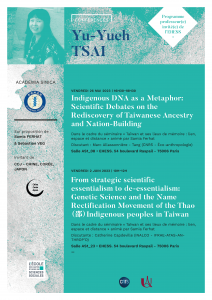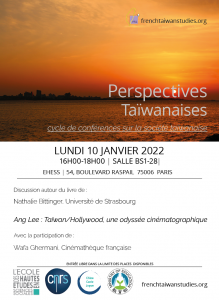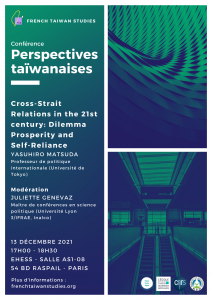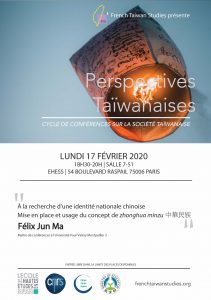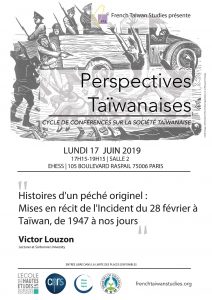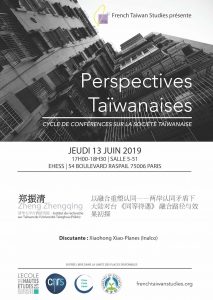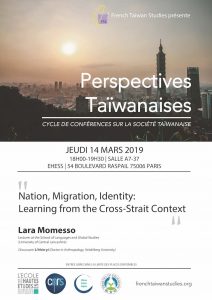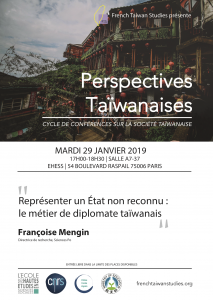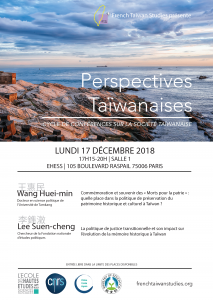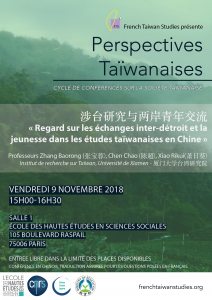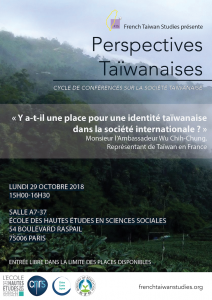Taiwan Perspectives
Taiwan Perspectives is a series of conferences focusing on Taiwan society. Through the various presentations from researchers and players in Taiwan studies, the conferences aim to shed light on critical contemporary issues in Taiwan. This series of conferences, organized in parallel to the “Taiwan and its memory spaces” seminar, is open to any person wishing to learn more about Taiwanese society in all its diversity.
Meeting with Beatrice Zani for the discussion of her book Women Migrants in Southern China and in Taiwan. Mobilities, digital economies and emotions (Routledge, 2022).
Beatrice Zani
Chargée de recherche au CNRS (LISE UMR 3320)
This book, based on extensive original research, explores the lives, the migratory experiences and the social, economic, and emotional practices of Chinese migrant women during their migrations and mobilities in China, from China to Taiwan, from Taiwan to China and in between the two countries. It illustrates how women on the move experience social contempt, misrecognition and economic marginalisation; how women migrants seek autonomy, economic independence, upward social mobility and modernity, but discover the Chinese inegalitarian social order and labour regimes which produce obstacles and impede their ambitions; and how old and new forms of subalternity are reproduced. Overall, the book emphasises what it feels like for the women migrants as they negotiate their way at the crossroad between subalternity and resistance, between subordinated labour and independent, digital entrepreneurship, and between an inegalitarian labour market and new, online opportunities for business and commerce.
Complementary sessions with Tsai Yu-yueh (26 May and 2 June 2023)
As part of the Taiwan Perspectives, Tsai Yu-yueh (Academia Sinica) will propose two complementary sessions as a complement to the seminar “Taiwan and its Realms of Memory: Bond, Space and Distance”.
26 May :
我會建議附檔我初稿的題目Indigenous DNA as a Metaphor: Scientific Debates on the Rediscovery of Taiwanese Ancestry and Nation-Building
附檔的初稿你先別外傳,但這個研究很有趣,有新的資料,包括台灣祖先爭議如何寫入新的歷史教科書,比較完整也有份量。
Abstract
The development of genealogical science in the twenty-first century has important implications for national and racial/ethnic construction. In Taiwan, genetic research on the origins of Taiwanese has involved racial/ethnic issues but also the dispute over Taiwan’s national identity with the People’s Republic of China, which claims that “we have the same roots” or “blood is thicker than water.” After the end of martial law (1945-1987), scientific research on multi-origins and genetic makeup of Taiwanese emerged. In particular, Marie Lin,M.D., widely known as “the mother of the research on Taiwanese blood,” and her teams have been devoted to revealing the origins of the ethnic groups in Taiwan. My research pushes the concept of co-production between science and politics (Jasanoff, 2004) further by addressing the “nationalization of biomedicine” and the “biomedicalization of the nation”. I explore how the Taiwan’s changing identity politics, including the emergence of the new categorization of four great ethnic groups, multiculturalism, and Taiwanese nationalism, has profoundly influenced genetic research on Taiwanese genealogy and how scientific findings produced in the lab have then spilled out into both Taiwan and the PRC through journals, media, history textbooks, and public disputes since the 1990s. For genealogical science to play a constructive role in identity-making, this research shows that we need to remain vigilant to genetic technology, scientific knowledge formation, and methodology by looking at scientists’ works and discourses through an STS perspective to extend the epistemological reflection.
2 June :
From strategic scientific essentialism to de-essentialism: Genetic Science and the Name Rectification Movement of the Thao(邵) Indigenous peoples in Taiwan
Abstract
Using the name rectification movement of the Thao people in Taiwan as an example, this article analyzes how name rectification activists used human genome research to achieve their re-naming goal. I use historical and field data to argue that Thao ethnic activists used DNA evidence as an example of “strategic scientific essentialism” in Thao identity formation. After the Thao was officially recognized by the Taiwan government in 2001, DNA evidence was deemphasized compared to land ownership, the establishment of a Thao national council, and the promotion of Thao language learning in the construction of Thao ethnicity. This shift from “strategic scientific essentialism” to “strategic scientific de-essentialism” confirms that ethnic identity is not primordial, but a product shaped by social and political change. The Thao’s successful re-naming campaign demonstrates how genetic knowledge can generate significant social effects on resource access and power redistribution by shaping ethnic identity and differences.
“Bonds to the native land: three generations of Waishengren (外省人) in Taiwan”
A conference held by Fu Si-tai (傅思台) (Doctor of Sociology, EHESS)
Monday 5 December 2022
Fu Si-tai will present the results of his fieldwork conducted among three generations of Waishengren, Taiwan, from 2017 to 2018. While focusing on the bonds to the native land, his talk will also investigate the dynamics of identification as well as the attachments to places that can be perceived as the homeland and/or the hosting land.
Ang Lee: Taïwan/Hollywood, une odyssée cinématographique
Monday 10 January 2022
4pm, Room BS1-28, EHESS, 54 Bd Raspail - 75006 Paris
Speaker:
Nathalie Bittinger – Senior Lecturer in Cinema Studies at the University of Strasbourg and member of the “Contemporary Approaches to Artistic Creation and Reflection” research Center.
Discussant :
Wafa Ghermani – Doctor in Cinema Studies, Film Collection Development Department of the Cinémathèque française
Summary of the talk:
This session of the Taiwanese Perspectives Series presents Nathalie Bittinger’s new opus, Ang Lee: Taïwan/Hollywood, une odyssée cinématographique(Éditions Maisonneuve & Larose). This first French-language book devoted to Ang Lee’s cinema examines the conditions of production, the main themes and the stylistic singularities of the fourteen opuses of this multi award-winning director, who straddles the line between mainstream cinema and the film d’auteur.
Cross-Strait Relations in the 21st Century: Dilemma Prosperity and Self-Reliance
Monday 13 December 2021
17h00-18h30, Room AS1-08, EHESS, 54 Bd Raspail - 75006 Paris
Speaker:
Yasuhiro Matsuda – Professor of International Politics, University of Tokyo
Moderator :
Juliette Genevaz – Senior Lecturer, University Lyon 3
Summary of the talk:
Taiwan is facing great difficulties in the management of its relations with Mainland China, which are a matter of life or death for Taiwan, because of the rise of China as a result of its high economic growth. So long as China proceeds with its strategy of promoting political unification based on Taiwan’s economic dependence while Taiwan pursues economic prosperity, Taiwan will be compelled to deepen economic relations with China at the sacrifice of its political independence. Conversely, if Taiwan seeks to maintain its political independence, it must hold economic relations with China in check at the sacrifice of its prosperity. This is the “dilemma of choosing between prosperity and self-reliance” faced by Taiwan.
References :
- MATSUDA Yasuhiro, The Taiwan Policy of the Xi Jinping Administration in its Second Term: An Outlook on Cross-Strait Relations in the “New Era”, Project of the Kajima Institute of International Peace, Society of Security and Diplomatic Policy Studies.
- MATSUDA Yasuhiro, Normalized Tensions in the Cross-Strait Relations — Structural Changes in Taiwanese Society and the Xi Jinping Administration’s Strategic Shift —, Society of Security and Diplomatic Policy Studies.
In Search of a Chinese National Identity: Implementation and Use of the Concept of Zhonghua Minzu 中華民族
Monday 17 February 2020
18h30-20h, Room 7-51, EHESS, 54 Bd Raspail - 75006 Paris
Félix Jun Ma – Senior Lecturer, Paul-Valéry Montpellier 3 University
The presentation takes as its subject the question of how the modern Chinese identity was constructed. At the end of the Qing, the military defeats of the Chinese empire at the hands of the Western nations and Japan brought about the collapse of the Sinocentric vision. This fundamental transformation forced China to build a nation-state comprising a political reassessment based on the collective identity of the nation. When the term zhonghua minzu (“Chinese nation” or “Chinese nationality”) was coined, it was primarily in reference to the Japanese concept of zokumin 族民, which emphasizes the historical and cultural factors on which the nation is based, but it is also in contrast to the notion of zhongzu 種族 (“race”), which distinguishes peoples on the basis of primarily physical characteristics. The concept was also redefined to bring together the various ethnic groups living on Chinese territory, that is, the Han Chinese, the Muslim Hui, Mongols, Tibetans, etc. Its use became widespread and was a genuine popular success, first during the Second Sino-Japanese War (1937-1945) and then under the Communist regime. In mainland China, the notion of zhonghua minzu is also promoted by Beijing with the idea of incorporating the Taiwanese into the Chinese nation under the banner of national reunification. In Taiwan, on the other hand, while the Kuomintang tried to strengthen this Chinese identity so dear to the people during the era of Chiang Kai-shek and Chiang Ching-kuo, this “orthodox” vision is now being challenged by the Progressive Democratic Party, which defends a “distinctly Taiwanese” identity. Thus, the many uses made of the concept of zhonghua minzu are just as problematic as its creation.
Stories of an original sin: the narrative of the 28 February Incident in Taiwan, from 1947 to today
Victor Louzon – Lecturer, Sorbonne Université
以融合重塑认同——两岸认同矛盾下大陆对台 《同等待遇》 融合路径与效果初探
Thursday 13 June 2019
17h00-18h30, Room A5-51, EHESS, 54 Bd Raspail - 75006 Paris
郑振清 (Zheng Zhengqin) – 清华大学台湾研究院 (Tsinghua University Research Center on Taiwan, Beijing)
Guest Speaker : Xiaohong Xiao-Planes (Inalco)
Nation, Migration, Identity: Learning from the Cross-Strait Context
Jeudi 14 mars 2019
18h00-19h30, Salle A7-37, EHESS, 54 Bd Raspail - 75006 Paris
Lara Momesso – Lecturer, University of Central Lancashire
Representing a non-recognized State: the job of a Taiwanese diplomat
Tuesday 29 January 2019
17h00-18h30, Room A7-37, EHESS, 54 Bd Raspail - 75006 Paris
Françoise Mengin – Senior Researcher, Sciences Po
Memorial service and transitional justice
Monday 17 december 2018
17h15-20h, Room 1, EHESS, 105 Bd Raspail - 75006 Paris
Wang Huei-min (王惠民) – Doctor of Political Science at Tamkang University, 淡江大學政治學博士
Commemoration and remembrance of “those who died for their country”: its place in preservation policy of historical and cultural heritage in Taiwan.
(Presentation in Chinese with French translation)
Lee Suen-cheng (李鎨澂) – Researcher at the National Policy Foundation, 國家政策研究基金會研究員
Transitional justice policy and its impact on the evolution of historical memory in Taiwan.
(Presentation in French)
Taiwan studies and cross-strait youth exchanges
Friday 9 November 2018
Zhang Baorong (张宝蓉)
Chen Chao (陈超)
Xiao Rikui (萧日葵)
Taiwan Research Institute of Xiamen University (厦门大学台湾研究院)
Is there a place for a Taiwanese identity in international society?
Monday 29 october 2018
Mister Ambassador Wu Chih-Chung, Taipei Representative in France


